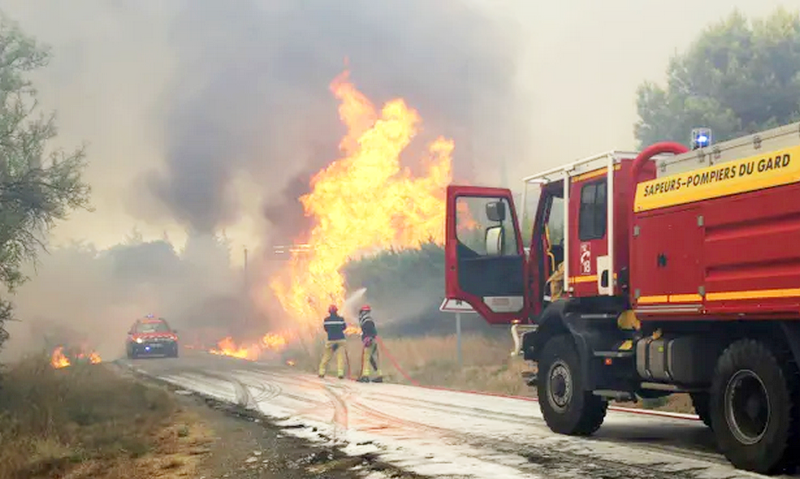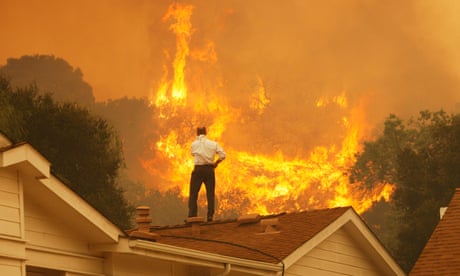Floods, storms, and heatwaves are direct products of the climate crisis.

The Guardian - John Vidal - Thu 4 Aug 2022 17.21 BST
That’s a fact, so where is the action?
As Guardian analysis reveals that human-caused global heating is driving more frequent and deadly weather disasters, there is no place for denialism anymore. Climate breakdown is supercharging the toll of extreme weather
In November 2015, prolonged and heavy rainfall dumped 341mm (13.4in) of rain in Honister, Cumbria, within 24 hours. Just as in 2009 and again in 2013, when massive rainstorms inundated Cumbria and the West Country, lives were lost, thousands of homes were flooded, it took months to recover from and cost hundreds of millions of pounds.
But how far have these winter storms been caused by the climate crisis? Until 2015, the stock answer of government and meteorologists was that it was impossible to attribute the climate emergency to any particular weather event and that they were most likely extreme, once-in-a-century disasters and by implication not much for politicians to worry about.
In 2009, Labour environment secretary Hilary Benn could say that the huge floods in Cumbria were a “once-in-a-millennium” meteorological event against whose consequences no community could wholly protect itself. He was right – up to a point. Many studies assessed in the 2007 Intergovernmental Panel on Climate Change (IPCC) report suggested that extreme weather events should be expected in a heating world – after all, the warmer the air, the more moisture it could hold – but attributed links between unusual flooding and the climate crisis could only be made with “medium” certainty.
That caution was correct and understandable, but it provided fuel for the arguments of deniers and right-wing think tanks, giving governments around the world the perfect excuse to do little or nothing. Fortunately, climate science moves fast and has a way of catching up with events. Advances in computer modeling meant that given enough long-term data it was possible to estimate the contribution made by the climate crisis to flood events. It was made easier in Britain because of the existence of detailed climate models and regional maps.

Pioneered by teams from Oxford University and the Netherlands, who used the computing power of thousands of desktop machines in people’s homes to run tens of thousands of simulations of individual weather events either with or without the climate crisis, it was shown conclusively in 2016 that global heating was at least partly responsible for increased flooding in Britain.
Now, with even greater computer power and insight, comes the most comprehensive compilation of global attribution studies, analyzing more than 500 recent extreme weather events, including heatwaves, droughts, floods, and storms. It shows beyond doubt that we are in the era of climate destruction and that the human destabilization of the climate is global and worsening. At least 12 of the most serious events, the authors conclude, would have been all but impossible without human-caused global heating.
The implications are sobering and must galvanize action. Not only does the new database show that climate breakdown is already ruining economies and costing tens of thousands of lives every year, but the continuing refusal of governments to act decisively will inevitably prove ecologically disastrous without immediate action.
It shows that a future of spiraling human disasters is all but certain. This year’s record-breaking heatwaves, the wildfires hitting the northern hemisphere, and the floods sweeping Australia, Bangladesh, Uganda, and elsewhere will almost certainly be attributed to global heating.
Astonishingly, it suggests that one in three deaths caused by summer heat over the last 30 years were the direct result of human-caused global heating, implying a death toll of millions – potentially more than Covid and HIV/Aids. Without rapid action to slash carbon emissions – by 50% by 2030 – far worse extreme weather will ensue.
With these new studies, the most important argument of deniers, oil companies, and reluctant governments not to act has been removed. With an immediate and growing global energy crisis gathering pace, and extreme weather affecting most people on Earth, governments must surely come together at the next UN climate summit in November to pledge immediate action.
That means the UK government must urgently invest billions of pounds to insulate buildings, oil companies must drop all plans to extract more oil, and renewable energy must be prioritized over all fossil fuel burning.
For 30 or more years we have had glimpses of what a hotter world would look like but have had only limited ways to understand what was happening. Now we begin to see the full picture of global heating. We are clearly all in it together.

John Vidal is a former Guardian environment editor
Editors Commentary:
HUMAN SYNTHESIS
COPYRIGHTS
Copy & Paste the link above for Yandex translation to Norwegian.
WHO and WHAT is behind it all? : >
The bottom line is for the people to regain their original, moral principles, which have intentionally been watered out over the past generations by our press, TV, and other media owned by the Illuminati/Bilderberger Group, corrupting our morals by making misbehavior acceptable to our society. Only in this way shall we conquer this oncoming wave of evil.
All articles contained in Human-Synthesis are freely available and collected from the Internet. The interpretation of the contents is left to the readers and does not necessarily represent the views of the Administrator. Disclaimer: The contents of this article are the sole responsibility of the author(s). Human-Synthesis will not be responsible for any inaccurate or incorrect statement in this article. Human-Synthesis grants permission to cross-post original Human-Synthesis articles on community internet sites as long as the text & title are not modified.
HUMAN SYNTHESIS